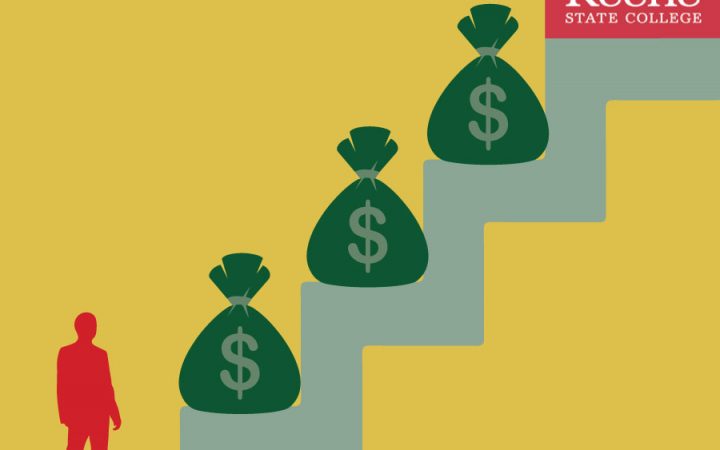Keene State College’s cost of tuition for in-state and out-of-state students is on the rise again. According to the 2016 KSC factbook, the tuition rates are increasing for in-state students by 2 percent and out-of-state students by 3 percent.
One of the major problems most college students face today is the massive loan debt they’ll collect upon graduating college, especially if tuition keeps increasing.
In exact costs, tuition will rise from $10,968 to $11,188 for in-state students and from $19,352 to $19,934 for out-of-state students according to the 2016 KSC factbook and KSC website.
Keene State College junior Lisa Shea, expressed her concern for the rising cost of tuition in the coming years.
“I have so much debt already — it’s not getting any easier,”she said.
Shea also brought up difficulties she’ll have if she wants to continue her education. “I’m especially concerned if I decide to go to graduate school after college, I won’t be able to afford it. I’m already in so much debt, it’s just inhibiting me from continuing my education,” she said.
KSC first-year Nicholas Moungsa had similar feelings. “I feel bad for people applying to college now. It just keeps getting more expensive and people have to be more conscientious of cost nowadays,” he said.
Why the rise
According to the College Factual Website that is aimed at helping high school students choose their best fit college, rising tuitions and cost for living expenses are projected to increase at most colleges.
“Unfortunately, tuition increases are very common…. In the past 10 years tuition has increased 3.5 [percent] per year at all public universities, and 2.4 [percent] at all private universities,” the College Board reported in an article highlighting the tuition trends in higher education.
KSC Interim Vice President for Finance and Planning Dr. Daniel Petree affirmed the Finance and Planning Department is working to keep the cost of a KSC education as affordable as possible. “Every college today finds itself in a similar situation. In order to continue to provide the best possible living and learning environment for our students, we have to struggle with increasing costs of operation. We don’t know what the future trend of our costs of operation will be,” Petree stated in an e-mail.
On their website, the University System of New Hampshire (USNH) board of trustees states they approve the tuition costs annually for the following public colleges: Keene State College, Granite State College, Plymouth State University and the University of New Hampshire.
This means the USNH has to be mindful of what affects these costs as well as KSC being aware themselves.
Other costs to factor in
For example, Dr. Petree shared the college’s difficulty paying for the energy supply.
“We are constantly looking for ways to reduce energy consumption,” he stated, and according to his estimates, “this year we will spend about $100,000 less than we had budgeted.”
However, Dr. Petree explained the KSC financial departments, as well as the USNH, have limited control over the rising costs of operations.
He stated the inflation of college tuition is truly affected by the market. “At the end of the day, we don’t set the price of energy. The market does. If the price goes up, we must pay it. Every college today finds itself in a similar situation,” he stated.
Too much of a good thing?
The National Bureau of Economic Research (NBER) is a “private, non-profit economic research organization that studies findings among academics, public policy experts and professionals, recently investigated the steep rise in college tuition from 1987 to current day” according to their website.
By conducting a study on the changes in underlying costs and reforms to the Federal Student Loan Program (FSLP), they’ve discovered the root causes to our increasing tuition trend.
“Changes in the FSLP alone generate a 102 [percent] tuition increase, and changes in the college premium generate a 24 [percent] increase,” the study reported.
In other words, federal aid programs loan a generous amount to students, causing more people to attend college, especially ones out of their typical price range. NBER described how this issue arises from more individuals being offered financial aid, in a theory otherwise known as the Bennett Hypothesis.
This means when more financial aid is granted, tuition is raised under the impression that these financial aid agencies will cover students’ costs associated.
After asking Dr. Petree about the link between the increasing availability of financial aid and the rising costs of tuition, he responded, “The link between financial aid and tuition is more complicated and nuanced.”
Then he explained,“The real cost (adjusted for inflation) of providing a college level education continues to increase.” He explained that the rising cost of tuition results from the rising cost of labor and supplies the school demands.
However, a NBER study concludes that increasing tuition to cover for the rising costs is not effective.
“The college cannot effectively offset this cost by raising revenue from the existing student body because it already engages in substantial rent extraction. Thus, the college must raise revenue from other sources and/or reduce costs,” the study reported.
Currently, Dr. Petree assured that one of KSC’s leading missions in cost reduction is finding another vendor to service the school’s bookstore.
Dr. Petree confirmed, “we have decided to work with Barnes and Noble, effective approximately May 15, 2017.” According to his estimations, after working a full year with Barnes & Noble the school is going to save between $200,000-$300,000.
For more information on how to save money or calculate your college expenses, visit the Student Accounts Office in the Elliot Center.
Katie Jensen can be contacted at kjensen@kscequinox.com

